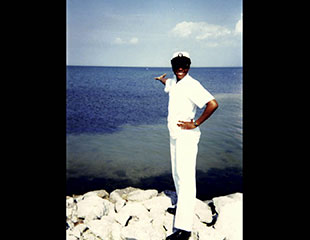Veteran Opens Up to Family To Help Heal Her Wounds
4-minute read
Veteran Opens Up to Family To Help Heal Her Wounds
4-minute read
By the time Tonya revealed to her mother, Ernestine, that she had been sexually assaulted during her four years of service in the U.S. Navy, nearly two decades had passed. Nearly two decades since Tonya returned home withdrawn, angry, and volatile—far removed from the happy and outgoing person she used to be. Nearly two decades since the changes in her behavior after experiencing military sexual trauma (MST) tore apart her friendships and family relationships.
But letting Ernestine know also was a final step, of sorts, in the Navy Veteran’s lengthy healing process.

It’s OK to seek help for invisible illnesses
“I couldn’t tell my story to anyone”
It should have been a routine trip. Tonya, who served as an operations specialist from 1994 to 1998, took a van to and from town while her ship was in port in a foreign country. Then, in a brutal attack, two male passengers and the male driver sexually assaulted her in the van.
Tonya reported the assault but felt more punished than helped. She also didn’t want to talk to anyone about what happened, especially the male health care providers who were always the ones treating her. “I couldn’t tell my story to anyone,” she says. “I was too afraid. I didn’t want to be looked at differently.”
Tonya’s job performance deteriorated and her military career ended. Being back home didn’t provide any relief.
“I lost my spouse, we were divorced,” Tonya says. “I went from a ton of friends to none. I was so scared of people and to go out.”
She withdrew even from her children, declining to help with homework or attend events like school plays. She continued to keep the assault a secret, including from her family, and her unexplained volatility scared her children and other family members.
Tonya describes it this way: “My parents, my brother, my sister, my daughter, relatives were saying: ‘We literally have to walk on eggshells around you. We don’t know what to say. You make us cry. You have no tact. You don’t care. You slam doors. You throw things down, and you’re acting up. We don’t know what’s wrong with you.’”
Tonya’s mother confirms the confusion and fear felt by members of the family. “Whenever any kind of confrontation or someone say any little thing, she would go off,” Ernestine says. “It was like everyone was against her.”
Beginning the healing process
Everyone’s path to healing from sexual trauma is different, including in terms of when they are ready to talk and who they feel they can tell.
“By the time I did begin to tell, it was so many years later, well over a decade later,” Tonya says. That’s when a Veterans programs manager talked to Tonya about VA benefits geared toward women. When Tonya got connected to VA health care, she asked if there were women mental health care providers.
“I’d like to talk to one,” she said.
That small crack opened the door.
“I was put with a psychologist, and boy, she was great,” Tonya says. “And she said, ‘You know, you’ve got a lot of stuff that you’re dealing and coping with, and you need to see a psychiatrist and get some medication going.’”
Tonya followed that advice. With continued treatment and therapy, she started to notice positive changes. “Then I found a way to begin telling my family,” she says.
Telling family and starting anew
“I did have my kids sit down, even my youngest,” Tonya says. “I had them sit down, and I explained to them what had happened. My oldest was like, ‘That’s why mom was so crazy, made us walk on eggshells for no reason. We get it now, we get it.’”
Now Tonya enjoys being a mom and fully participates in her children’s lives. “I go to everything they have going,” she says. She describes her relationship with her daughter—her oldest child—as “the best relationship ever.”
Tonya’s mother, although hurt not to have known about the assault for so long, saw their relationship improve. “We talk and we go out together, you know, which was good for me because that’s what we used to do before she went in the military,” Ernestine says.
Tonya adds: “It’s like when I was a little girl. We would do girl things, and hair and nails done, and ‘let’s go to the mall and shop,’ and I missed that. Now that I’m older, I realize that she’s more than my mom. She’s my friend too. And I feel more comfortable now about talking to her about anything.”
Tonya’s life improved in other ways. She graduated from college with multiple degrees, and she renewed her social life. “I just feel better,” she says. “I feel happier.”
Tonya encourages other Veterans who have experienced MST to speak up. “I would say to get professional help earlier than later,” Tonya says. “Tell someone and don’t just write it down. Just tell someone, even if it’s not a professional. Once you tell that one person, it gets easier to tell more and to get the help that you need.”
